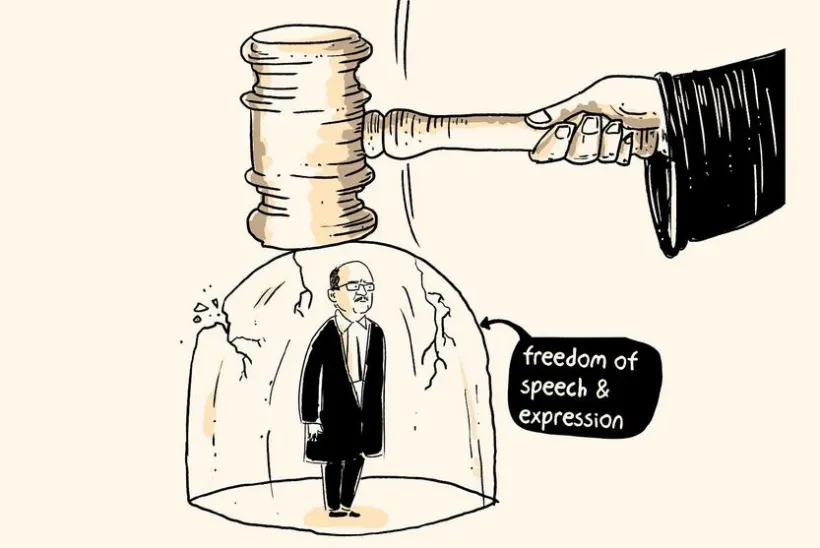Sharmishta Panoli, a 19-year-old Pune Law University student, posted a video to her social media account in which she spoke about India’s Operation Sindoor and named some Bollywood celebrities and how they seemed to have failed to speak on this matter, given their public image and social standing.
She further went on to make communal threats and use abusive language while expressing her dissent towards terror camps in Pakistan and POK. In another statement she referred to Gandhi, insinuating that India is no longer a nation that intends to follow the principle of non-violence.
This led to the influencer and law student facing major backlash on her social media accounts and even death threats, which made Sharmishta feel compelled to post another video apologising for her actions. Despite taking down the video and issuing a public apology, Panoli was arrested from her residence in Gurugram by the Kolkata Police on May 31 and transported to West Bengal, where she was remanded to 14 days of judicial custody by a court in Alipore.
This incident has ignited a national debate around freedom of speech, communal sensitivities, and the role of law enforcement in regulating digital expression. Her case reflects the broader tension in India between the right to dissent and the limits imposed by laws aimed at maintaining public order and communal harmony.
On one hand the arrest has been made on charges under the Bharatiya Nyaya Sanhita (BNS) under Sec-196 (1)(a), Sec-299, Sec-352 and Sec-353(1)(c) which seem justified on part of the Kolkata Police, and on the other hand, the views opined by Panoli fall under her Right to Freedom of Speech and expression.
Following the arrest, Panoli has received support from BJP MP Kangana Ranaut and Andhra Pradesh Deputy CM Pawan Kalyan, condemning the West Bengal government for what they view as an authoritarian overreach. Even internationally, Dutch MP Geert Wilders criticised the arrest as a violation of fundamental democratic values. Another critique has been that this arrest being so rushed and forceful goes to show the political inclinations which tend to curb those who speak up. Bar Council of India Chairperson and BJP Rajya Sabha MP Manan Kumar Mishra, Senior Advocate, has issued a statement condemning the arrest, stressing that Panoli was arbitrarily being subjected to harsh legal consequences.
The question here arises: What is Freedom of Speech and its extent, and when does it become Hate Speech?
As India is increasingly becoming more digital, one would expect to have the youth use these platforms to be vocal and express themselves without fear of the State. Freedom of Speech is the very soul of Democracy. Democracies thrive on dissent, debate, and the exchange of ideas, even when those ideas are uncomfortable, critical of the establishment, or unpopular among the majority. The framers of our Constitution were acutely aware of the need to preserve this liberty. Yet, they also recognized the need for reasonable restrictions. This duality—protection versus restriction—has always been a tightrope walk in Indian jurisprudence.
Democracy does not guarantee that speech will always be polite or popular—it guarantees that speech, unless demonstrably harmful, will be protected. The right to critique religious or political institutions, express moral outrage, or question state actions is not a luxury; it is a democratic necessity.
Article 19(1)(a) of the Constitution guarantees all citizens the right to freedom of speech and expression. However, Article 19(2) allows the state to impose “reasonable restrictions” in the interests of public order, decency, morality, or the sovereignty and integrity of India.
The question in Panoli’s case is whether her commentary crossed the line into hate speech or was a provocative but constitutionally protected opinion. The judiciary has held in multiple judgments, such as Shreya Singhal v. Union of India, that vague or subjective interpretations of offensive content must not be used to stifle legitimate expression. Yet, in cases involving communal sentiments, the courts often adopt a cautious approach, prioritizing public peace over individual rights.
While Panoli’s video may have carried political or religious undertones, her immediate apology and deletion of the post show a willingness to de-escalate. The state’s choice to pursue criminal charges despite this conciliatory action appears, to many, disproportionate. Critics argue that her arrest, executed by flying a police team across states, appears more like a show of power than a proportionate response to a speech offence.
In a democracy, the cure for offensive speech is not incarceration, but more speech—critique, rebuttal, counter-narratives. The moment we allow governments to police thought and punish opinion, we risk replacing democratic institutions with authoritarian reflexes.
As courts prepare to hear challenges to her detention, the outcome will likely shape not just her fate but also the standards by which online expression is judged in a deeply pluralistic, yet increasingly polarized society.
The law must act as both a sword against incitement and a shield for liberty. Striking the right balance is not just a legal necessity—it is a democratic imperative.
Contributed by: Aishwarya Sharma (Intern)

